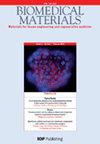Evaluation of properties for Carbothane™ 3575A-based electrospun vascular grafts in vitro and in vivo.
IF 3.7
3区 医学
Q2 ENGINEERING, BIOMEDICAL
引用次数: 0
Abstract
Bioengineered vascular grafts have emerged as a promising alternative to the treatment of damaged or occlusive vessels. It is thought that polyurethane-based scaffolds possess suitable hemocompatibility and biomechanics comparable to those of normal blood vessels. In this study, we investigated the properties of electrospun scaffolds comprising various blends of biostable polycarbonate-based polyurethane (Carbothane™ 3575A) and gelatin. Scaffolds were characterized by scanning electron microscopy, infra-red spectroscopy, small-angle X-ray scattering, stress-loading tests, and interactions with primary human cells and blood. Data from in vitro experiments demonstrated that a scaffold produced from a blend of 5% Carbothane™ 3575A and 10% gelatin has proven to be a suitable material for fabricating a small-diameter vascular graft. A comparative in vivo study of such vascular grafts and ePTFE grafts implanted in the abdominal aorta of Wistar rats was performed. The data of intravital study and histological examination indicated that Carbothane-based electrospun grafts outclass ePTFE grafts and represent a promising device for preclinical studies to satisfy vascular surgery needs.评估基于 Carbothane™ 3575A 的电纺血管移植物在体外和体内的特性。
生物工程血管移植物已成为治疗受损或闭塞血管的一种有前途的替代方法。据认为,聚氨酯基支架具有适当的血液相容性和与正常血管相当的生物力学性能。在这项研究中,我们研究了电纺支架的特性,其中包括各种生物稳定性聚碳酸酯基聚氨酯(Carbothane™ 3575A)和明胶的混合物。通过扫描电子显微镜、红外光谱、小角 X 射线散射、应力加载测试以及与原代人体细胞和血液的相互作用对支架进行了表征。体外实验数据表明,由 5% Carbothane™ 3575A 和 10% 明胶混合制成的支架已被证明是制造小直径血管移植物的合适材料。对这种血管移植物和植入 Wistar 大鼠腹主动脉的 ePTFE 移植物进行了体内对比研究。体内观察研究和组织学检查数据表明,基于硫化卡硼烷的电纺移植物优于聚四氟乙烯移植物,是临床前研究满足血管外科需求的一种有前途的装置。
本文章由计算机程序翻译,如有差异,请以英文原文为准。
求助全文
约1分钟内获得全文
求助全文
来源期刊

Biomedical materials
工程技术-材料科学:生物材料
CiteScore
6.70
自引率
7.50%
发文量
294
审稿时长
3 months
期刊介绍:
The goal of the journal is to publish original research findings and critical reviews that contribute to our knowledge about the composition, properties, and performance of materials for all applications relevant to human healthcare.
Typical areas of interest include (but are not limited to):
-Synthesis/characterization of biomedical materials-
Nature-inspired synthesis/biomineralization of biomedical materials-
In vitro/in vivo performance of biomedical materials-
Biofabrication technologies/applications: 3D bioprinting, bioink development, bioassembly & biopatterning-
Microfluidic systems (including disease models): fabrication, testing & translational applications-
Tissue engineering/regenerative medicine-
Interaction of molecules/cells with materials-
Effects of biomaterials on stem cell behaviour-
Growth factors/genes/cells incorporated into biomedical materials-
Biophysical cues/biocompatibility pathways in biomedical materials performance-
Clinical applications of biomedical materials for cell therapies in disease (cancer etc)-
Nanomedicine, nanotoxicology and nanopathology-
Pharmacokinetic considerations in drug delivery systems-
Risks of contrast media in imaging systems-
Biosafety aspects of gene delivery agents-
Preclinical and clinical performance of implantable biomedical materials-
Translational and regulatory matters
 求助内容:
求助内容: 应助结果提醒方式:
应助结果提醒方式:


